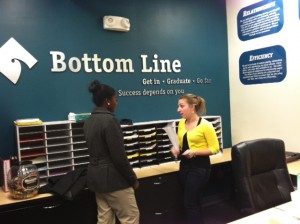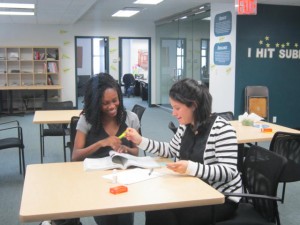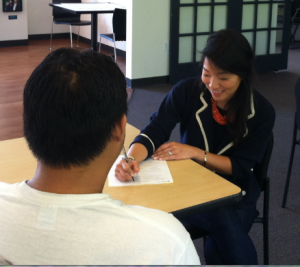In a recent Education Week blog article, “Community College Transfers Often Do Well at 4-Year Institutions,” author Caralee Adams cites positive data from the National Student Clearinghouse regarding the success rates of students obtaining BA degrees after transferring from two-year colleges. This report states that “In the 2010-11 academic year, 45 percentof all students who completed a degree at a four-year institution had previously enrolled at a two-year institution.”
I must admit that I was surprised to find such a successful rate of transfer students in this report; throughout my 6 years of experience working with low-income and first-generation students in Massachusetts, I have not witnessed the same result for students who begin their education at a two-year institution. Out of the hundreds of students I have worked with at Bottom Line, I can count on one hand the number who have successfully transferred from a community college and received a bachelor’s degree within six years–so these students are the exception, not the rule.
In order for students to transfer to a four-year college, they must be successful at the start of their two-year college experience, and this is often not the case. Getting to the Finish Line: College Enrollment and Graduation, a report by the Boston Private Industry Council and Northeastern University’s Center for Labor Market Studies that tracks graduation data from the Boston Public High Schools’ Class of 2000, found that only 12.5% of students who enrolled in a two-year public college directly after high school obtained any kind of college degree within seven years. With this rate, it’s no surprise that counselors and college professionals are hesitant to recommend starting the college experience at a two-year institution.
Massachusetts ranks 47th on the National Student Clearinghouse’s report with only 23% of four-year college graduates getting their start at a two-year institution. While there may be a variety of reasons for this, in my experience, students in MA often have a negative association with attending a two-year college that doesn’t as appear to be a prevalent in a states like Texas, where 78% of four-year college graduates start out at a two-year school. The students in our program that enroll at a community college are usually doing so because they did not get accepted anywhere else and are often discouraged before they begin due to the stigma and low graduation rates at many of these institutions.
Nonetheless, it makes a lot of sense for certain students to start off at a community college. Ideally, these schools offer an affordable option for students needing remedial academic support, and a safe place for students to explore whether or not college is the right path for them. Financially, a student can complete general education requirements at a community college for around $4,000 per year and it can be covered by a Pell Grant. Academically, students unprepared for Bachelor’s degree level coursework are better off beginning their college experiences at a community college where credits are more affordable and remedial academic support is offered. Because so many of the students entering community college are those needing remedial support, however, their path to getting a degree is a long one.
As tuition and fees continue to skyrocket at four-year institutions across the state, more students are going to need to explore creative ways to obtain a college degree. I for one look forward to the day when more students can begin their college careers at two-year institutions. It would save them money and often could save them time, but until there is a shift in the stigma associated with Community College this will not likely be the case. In order to change the perception, we must start seeing more positive results in graduation and transfer rates at these institutions. While the northeast is often looked upon as leading the way in higher education, this seems to be a clear example of where we have a lot to learn from the states to our south and west.
– Sarah Place
Director of Curriculum and Training
Cross-posted at Aspire Wire: Ideas, Conversation, Action on Tuesday, November 27, 2012






